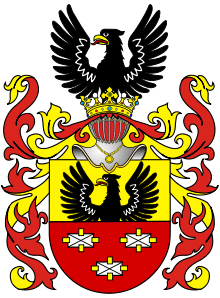Władysław Oporowski

Władysław Oporowski (1395–1453) was a Polish medieval political and religious leader. Deputy Chancellor of Poland (1429–1434), Bishop of Kujawy (1434–1449), archbishop of Gniezno and primate of Poland (1449–1453). It is recognized that he was a much better diplomat and politician than church official.[1]
Biography
Władysław Oporowski was born in 1395 as the second son of the voivode of Łęczyca, Mikołaj z Oporowa. His family coat of arms was Sulima.
He studied at the University of Padua and worked in the Royal Chancellery. In 1422 together with Mikołaj Kiczka he represented Poland and the Polish king Władysław Jagiełło in the legal proceedings between Poland and the Teutonic Order before the Holy See in Rome. Such diplomatic service for Jagiełlo, and than his son, Casimir IV Jagiellon, gained him political support from the king; he also received numerous prelate and canon positions.[1] In 1426 he lectured as the professor of law at the Cracow Academy.[2]
After the death of archbishop and primate Wincenty Kot, the position was proposed to Zbigniew Oleśnicki, but he refused it.[1] After that, Polish king Casimir IV, whose Oporowski's was a strong supporter of, proposed Oporowski's candidature.[1] The candidature passed, although not without objections from the metropolitan chapter.[1]
Oporowski's reign as the archbishop and primate was rather controversial. Soon after he was elected as archbishop and primate, he ordered that all gifts and nominations given out by his predecessor are to be taken back.[1] He further offended local church officials by refusing to participate in the traditional ingres (welcoming) in the Gniezno Cathedral, and finally accused many of them of corruption and financial misappropriation following primate's Kot's death.[1] One of his chief political opponents was cardinal Zbigniew Oleśnicki, whose nomination to cardinal few years back was vocally opposed by Oporowski.[1][3]
Oporowski rarely stayed in Gniezno, instead preferring his family seat at Oporów.[1] He was not very interested in the issues of the Gniezno diocese; instead he was focused on improving his own political power and wealth.[1] In Oporów, he oversaw the construction of the Oporów Castle.[4] He died on 11 March 1453 in the Oporów Castle, and was buried in the local church.[1]
Notes
- 1 2 3 4 5 6 7 8 9 10 11 (Polish) Bernadeta Kruszyk, Władysław Oporowski, Poczet Arcybiskupów Gnieźnieńskich, Archidiecezja Gnieźnieńska
- ↑ (Polish) Kazimierz Morawski, Historya Uniwersytetu Jagiellońskiego: Srednie wieki i odrodzenie. Z wstepem o Uniwersytecie Kazimierza Wielkiego, Volume 1, Z drukarni Uniwersytetu Jagiellońskiego pod zarzạdem J. Filipowskiego, 1900, Google Print, p.274 (public domain)
- ↑ Natalia Nowakowska, Church, state and dynasty in Renaissance Poland: the career of Cardinal Fryderyk Jagiellon (1468-1503), Ashgate Publishing, Ltd., 2007, ISBN 0-7546-5644-6, Google Print, p.24
- ↑ Neal Bedford, Poland, Lonely Planet, 2008, ISBN 1-74104-479-0, Print, p.134
Further reading
- J. Fijałek, Polonia apud Italos scholastica saeculum XV, Kraków 1900, s. 54-57.
- A. Gąsiorowski, Oporowski Władysław (właściwie Władysław z Oporowa) h. Sulima (zm. 1453), podkanclerzy koronny, biskup włocławski, potem arcybiskup gnieźnieński i prymas, Polski Słownik Biograficzny, t. XXIV, Wrocław 1979, s. 142-144.
- J. Korytkowski, Arcybiskupi gnieźnieńscy, prymasowie i metropolici polscy od roku 1000 aż do roku 1821, t. I-V, Poznań 1888-1892.
- M. Kosman, Poczet prymasów Polski, Warszawa 1997, s. 85-88.
- P. Nitecki, Biskupi Kościoła w Polsce. Słownik biograficzny, Warszawa 1992, s. 155.
- K. R. Prokop, Arcybiskupi gnieźnieńscy w tysiącleciu, Kraków 2000, s. 130-133.
- Zofia Wilk-Woś, Władysław z Oporowa (ok. 1395-1453), podkanclerzy królewski, biskup włocławski i arcybiskup gnieźnieński, „Studia Claramontana”, t. 21, 2003, s. 174-449.
| Catholic Church titles | ||
|---|---|---|
| Preceded by Wincenty II Kot |
Primate of Poland Archbishop of Gniezno 1449–1453 |
Succeeded by Jan II ze Szprewy |